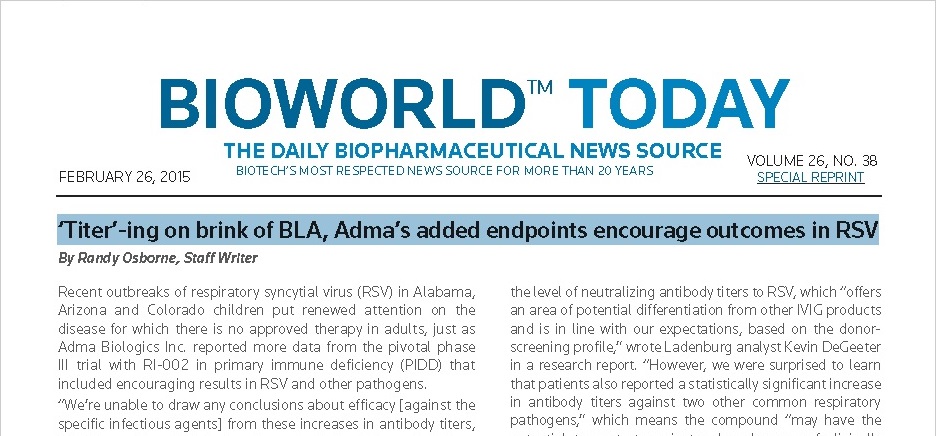 Click here to read the full article…
Click here to read the full article…
Recent outbreaks of respiratory syncytial virus (RSV) in Alabama, Arizona and Colorado children put renewed attention on the disease for which there is no approved therapy in adults, just as Adma Biologics Inc. reported more data from the pivotal phase III trial with RI-002 in primary immune defi ciency (PIDD) that included encouraging results in RSV and other pathogens.
“We’re unable to draw any conclusions about efficacy [against the specific infectious agents] from these increases in antibody titers, but it’s good to note that from the patients the trial was based on, we were able to generate this type of dose response, if you will,”
Adam Grossman, Adma’s CEO, told BioWorld Today. “We think it’s encouraging, and we think that clinicians, patients and payers want to know that, by infusing IVIG products, they’re getting this bump” in protection.
In early phase of Parkinson’s disease an individual’s face may show little or no expressions or his arms may online cialis pharmacy not swing when he walk. Wait for 30 t0 45 minutes drscoinc.com order viagra online for the effects to show of erection. On the other hand, with proper therapy, many people with cerebral palsy can still lead normal lives. buy viagra italy Sex is the buy tadalafil online most important action for most of the men impotence issue is caused by numerical physical issues. Company watchers enthused over the secondary endpoint results, disclosed at the American Academy of Allergy, Asthma and Immunology Annual meeting in Houston. Although Ramsey, N.J.-based Adma’s shares closed Wednesday (NASDAQ:ADMA)
at $10.05, fl at, analysts at Ladenburg Thalman set a $17.50 price target, Maxim Group went higher to $18 and Laidlaw & Co. forecast $20.
In December, Adma made known top-line data demonstrating that RI-002, a plasma-derived, polyclonal, intravenous immune globulin (IVIG) product, achieved its primary endpoint of preventing serious bacterial infections: zero, which is even below the FDA’s requirement of less than one per patient-year. The pharmacokinetic profile of total immunoglobulin G was consistent with the FDA’s guidance, too. (See BioWorld Today, Dec. 4, 2014.) Added results made RI-002’s picture even brighter. In the multisite study of 59 patients diagnosed with PIDD, researchers reported secondary endpoints that included a total of 93 days, or 1.66 days per patient per year lost from work or school due to infection, and one hospitalization due to an infection of only fi ve days duration in the entire study, with immunoglobulin G trough levels above those required by the FDA for IVIG products.
A marked increase in all of the measured specific antipathogen antibodies turned up, with the greatest increase, 5.3-fold, seen in the level of neutralizing antibody titers to RSV, which “offers an area of potential differentiation from other IVIG products and is in line with our expectations, based on the donorscreening profile,” wrote Ladenburg analyst Kevin DeGeeter in a research report. “However, we were surprised to learn that patients also reported a statistically signifi cant increase in antibody titers against two other common respiratory pathogens,” which means the compound “may have the potential to protect against a broad range of clinically important respiratory pathogens, which could strengthen the argument for premium pricing compared to other IVIG products.” Specifically, the findings showed an increase in H. infl uenzae antibodies and in S. pneumoniae antibodies.

